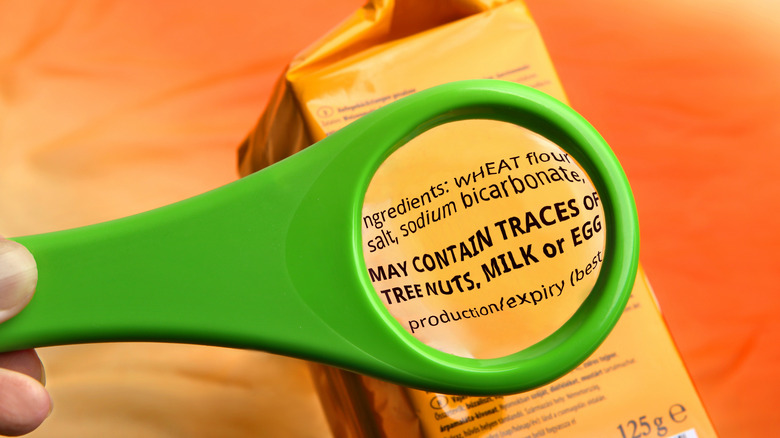Surprising Ingredients To Avoid If You Have An Egg Allergy
Eggs are a nutritional powerhouse, but not everyone can reap their benefits. Researchers report that it's one of the most common allergies, especially in children — about 2% of children have an allergy to eggs, reports the American College of Allergy, Asthma, and Immunology (ACAAI). People with an egg allergy experience indigestion, vomiting, dizziness, hives, and other allergic reactions. The symptoms occur within minutes after eating eggs, mayo, meringue, or other foods containing egg as an ingredient and can range from mild to severe. While it's much more common in children, healthy adults can sometimes develop this condition, too, according to a recent case report featured in Clinical and Molecular Allergy.
Generally, people who are allergic to chicken eggs may also have difficulty eating goose or quail eggs, according to the ACAAI. Turkey and duck eggs may cause issues as well. Some may experience mild adverse reactions like a runny nose and watery eyes, while others can go into anaphylactic shock, a potentially life-threatening condition. Stomach cramps, nausea, diarrhea, and breathing problems are also common.
Unfortunately, there's not much you can do about this allergy other than avoiding eggs, which are a common ingredient in many dishes, including meatloaf, waffles, puddings, sauces, and ice cream. Some manufacturers may also add eggs to fast food or even lollipops, which can pose challenges for those with food allergies. Given these aspects, it's essential to double-check the ingredient list and take proper precautions when eating out.
Hidden sources of eggs that can trigger allergies
Eggs are often used as a binding agent in soups, baked goods, and sauces, but it's not always easy to spot this ingredient (per Hamilton Health Sciences). For example, many snacks and packaged foods contain albumin, phosvitin, livetin, globulin, lysozyme, and other additives derived from eggs. Egg substitutes, egg solids, and dried eggs can also cause allergic reactions. Sometimes manufacturers don't even list these ingredients on food labels — instead, they use generic terms like "emulsifier" or "binder."
As a general rule, steer clear of any ingredients starting with "ova" or "ovo," a prefix derived from the Latin word "ovum" (egg), recommends Healthline. Note that meatloaf, meatballs, and some specialty beverages may contain eggs, too. It's not uncommon to find this ingredient in coffee, wine, or even beer, says Hamilton Health Sciences. Some chefs and food manufacturers also add eggs to bread, crackers, tortillas, and salad dressings, warns Food Allergy Research and Education. The same goes for most pastas, deep-fried foods, and other fast-food products (per WebMD).
The U.S. Food and Drug Administration requires manufacturers to list chicken eggs and other major food allergens on labels, but these regulations don't apply to quail, duck, or goose eggs. What's more, restauranteurs aren't legally obligated to warn customers about cross-contamination unless the food has been prepackaged before you purchased or ordered it. Therefore, it's your responsibility to read the nutrition labels on packaged foods and let your waiter know if you're allergic to eggs.


